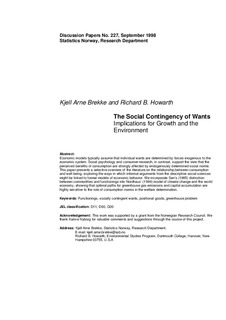| dc.contributor.author | Brekke, Kjell Arne | |
| dc.contributor.author | Howarth, Richard B. | |
| dc.date.accessioned | 2012-02-07T22:05:06Z | |
| dc.date.available | 2012-02-07T22:05:06Z | |
| dc.date.issued | 1998 | |
| dc.identifier.issn | 1892-753x | |
| dc.identifier.uri | http://hdl.handle.net/11250/180775 | |
| dc.description.abstract | Economic models typically assume that individual wants are determined by forces exogenous to the economic system. Social psychology and consumer research, in contrast, support the view that the perceived benefits of consumption are strongly affected by endogenously determined social norms. This paper presents a selective overview of the literature on the relationship between consumption and well-being, exploring the ways in which informal arguments from the descriptive social sciences might be linked to formal models of economic behavior. We incorporate Sen’s (1985) distinction between commodities and functionings into Nordhaus’ (1994) model of climate change and the world economy, showing that optimal paths for greenhouse gas emissions and capital accumulation are highly sensitive to the role of consumption norms in the welfare determination.
Keywords: Functionings, socially contingent wants, positional goods, greenhouse problem | no_NO |
| dc.language.iso | eng | no_NO |
| dc.publisher | Statistics Norway, Research Department | no_NO |
| dc.relation.ispartofseries | Discussion Papers;No. 227 | |
| dc.subject | Environment | no_NO |
| dc.subject | Greenhouse gases | no_NO |
| dc.subject | Social contingency of wants | no_NO |
| dc.subject | Consumption | no_NO |
| dc.subject | Consumer research | no_NO |
| dc.subject | Social psychology | no_NO |
| dc.subject | Social norms | no_NO |
| dc.subject | Economic behavior | no_NO |
| dc.subject | JEL classification: D11 | no_NO |
| dc.subject | JEL classification: D60 | no_NO |
| dc.subject | JEL classification: Q00 | no_NO |
| dc.title | The social contingency of wants implications for growth and the environment | no_NO |
| dc.type | Working paper | no_NO |
| dc.subject.nsi | VDP::Social science: 200::Economics: 210::Economics: 212 | no_NO |
| dc.source.pagenumber | 22 s. | no_NO |
